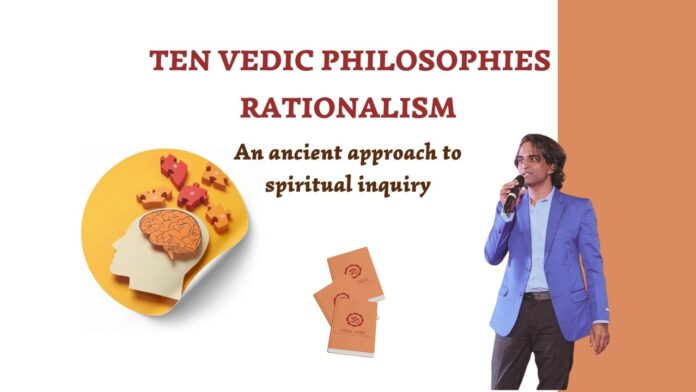Can I be rational and spiritual at the same time?
In the previous article, we discussed epistemology and in this article we will discuss the philosophical idea “rationalism”.
Often, spiritual paths can lead us to unquestioningly accept certain beliefs. Rationalism, the philosophical view that reason is the primary source of knowledge, offers a valuable tool for spiritual inquiry.
By analysing information logically and identifying underlying principles, we can gain a deeper understanding of how things work. This is crucial in fields like science, mathematics, and engineering. In philosophy, rationalism emphasizes reason and logic as the primary sources of knowledge. This provides a solid foundation for philosophical inquiry by prioritizing clear thinking, logical arguments, and the pursuit of truth.
In this article we will discuss a balanced approach which involves the use of reason to discern truth and progress in spiritual journey.
Rationalism in Vedic Tradition
In the Vedic tradition, reason is not seen as a threat to spirituality but as a valuable ally.
Samkhya: The Samkhya school of philosophy, one of the six major schools of Hindu philosophy, is particularly renowned for its emphasis on rational inquiry. It employs logical reasoning to understand the nature of reality and the human condition. Scholar M. Hiriyanna says “The very name of the doctrine, derived from Samkhya which means buddhi, indicates that it is based on reflection rather than on authority”. Though Samkhya school accepted the authority of Veda, it laid emphasis on “rationalism” and developed a rigorous method of enquiry into the nature of reality.
Nyaya: It is a philosophical school of Vedic thought which contains a rigorous system of logical reasoning providing a framework for analysing and understanding the world, both physical and spiritual. Today, all the contemporary teachings of Vedic scriptures invariably involve learning of Nyaya doctrines. In Tattvavada tradition of Sri Madhwacharya, learning “Nyaya Sudha” is a benchmark for identifying a Madhwa Scholar. Nyaya as ancient Darshana and as a new school of thought has contributed heavily to the Vedanta school. Nyaya plays a crucial role in spiritual practice by encouraging critical thinking and rational inquiry. By applying logical reasoning to spiritual teachings, practitioners can discern truth from falsehood and avoid blind faith.
Vedanta: Vedanta offers a systematic approach to spirituality which involves integrating empirical knowledge, reason and revelations of Vedic sages. While upholding the ultimate authority of Vedas, all sub schools of Vedanta invariably require learning of “Nyaya Shastra” in order to rationally analyse Vedic knowledge.
Practical approach of Vedanta:
While reason can help us to understand the world around us, empirical knowledge allows us to arrive at objective conclusions. Coupled with Vedic knowledge this approach helps us to arrive at subjective conclusions.
This approach connects us with the ultimate reality which is greater than ourselves, yet keeps us grounded to rational thought process.
Reconciliation:
Rationality and spirituality: One can be both rational and spiritual. A balanced approach involves recognizing the values and limitations of both rationality and religious doctrines, and integrating them in a way that enriches our lives, both material and spiritual.
Questioning beliefs: One of the core principles of rational inquiry is to question everything, including our own beliefs. Instead of blindly accepting teachings or doctrines, we should critically examine them and seek evidence to support them. This doesn’t mean doubting everything, but rather approaching beliefs with a healthy scepticism. By asking questions like “Why do I believe this?” and “What evidence supports this belief?”, we can deepen our understanding and strengthen our spiritual convictions.
Discerning truth: Logical reasoning is a powerful tool for discerning truth from falsehood. By applying the principles of logic, we can evaluate the coherence and consistency of our beliefs. We can also distinguish between genuine spiritual insights and mere speculation. For example, if a spiritual teaching contradicts well-established scientific knowledge or logical reasoning, we should approach it with caution.
Resolving doubts: Doubt is a natural part of the spiritual journey. When faced with uncertainty, we can use reason to explore different perspectives and arrive at a clear understanding. This may involve consulting with spiritual teachers, studying sacred texts, or engaging in meditation and contemplation. By approaching doubt with an open mind and a willingness to learn, we can overcome obstacles and deepen our spiritual practice.
In the next article, we will discuss the philosophical idea “pantheism”.
Madhwesh K
Vedic Tribe

